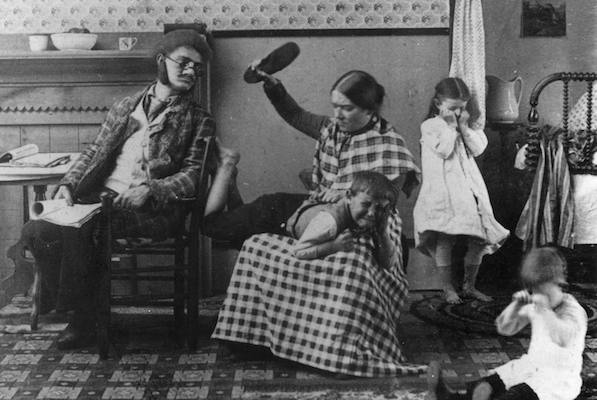The long, intermittent debate about whether parents should be allowed to spank their children has erupted once again with the finding by an American research team that it doesn’t do children any harm provided it is tempered by love. Whether it does them any good is another matter, and it’s not really the point; for in this country it is the right of parents to spank children if they feel like it, and not the consequences for the children themselves, that has always been the main issue.
This doesn’t mean that there aren’t people who believe that corporal punishment is the best way of disciplining a child, and Dr Liam Fox, as shadow health secretary, spoke for them some years ago when he said that ‘smacking children to teach them the difference between right and wrong is often a necessary, if painful, task’. But opinion polls have shown that the vast majority of British parents are as strongly protective of their right to spank as Americans are of their right to bear arms, and they probably regard any threat to it as another example of intolerable interference by the goody-goodies of Brussels.
The research carried out at the Albert Einstein College of Medicine in New York concluded that spanking a child was all right provided it came from ‘a good place’, meaning that it was done in a loving way against a background of solid parental affection. But what a creepy idea. How is it possible to smack a child in a loving way? In a decent world, a child only gets smacked when it has temporarily forfeited a parent’s love. For smacking to be acceptable, there has to be anger involved. The child must have driven its mother or father to a point of exasperation at which no other response seems possible. Spanking is a parental cry for help. It is a message to the child saying, ‘Please stop winding me up; I just can’t take it any more.’ And sometimes that works as a means of making the child change its ways.
To spank a child ‘in a loving way’, however, suggests a considered decision to teach it a lesson. It is in line with the claim schoolmasters used to make when they were still allowed to beat their pupils — that the beating hurt them more than it hurt the child. Few people ever believed them, and they were quite right not to. Probably more typical of schoolmasters in those days was the late Mr Dix, the former headmaster of Auberon Waugh’s Roman Catholic preparatory school, All Hallows in Somerset. In his autobiography, Will This Do?, Waugh described the regular beating sessions in Mr Dix’s study as follows: ‘Beatings were administered either with an evil-looking slipper, already in tatters by the time I arrived and known to generations of its victims as “The Furry Object”, or with a gym shoe called “Jimmy”. I do not know why he always beat the boys with their trousers down, but in the mellowness of middle age I cannot grudge him whatever small satisfaction he derived from the practice.’
The last Labour government was quite right to make it illegal for parents to smack children with anything other than a hand on the bottom, for the use of a shoe or a slipper, as well as inflicting more damage on the child, suggests a punishment carried out after cold-blooded preparation. And there is precious little evidence to suggest, and certainly not in Auberon Waugh’s case, that repeated beatings throttle a tendency towards delinquency and subversion. Unlike Waugh, I was never once beaten during my schooldays, which must reflect conformism and timidity. And it is something of which I have always been rather ashamed, especially since, as captain of my House at Eton, I was later sometimes required to cane other boys on their behinds.
And only once do I remember being smacked by my father. This was nearly 70 years ago, when I was four years old, and it was for repeatedly disturbing my mother when she was lying, ill, on a sofa. It must have made a great impression on me, for although my memory is usually bad, I remember every detail of the event with great clarity. Perhaps this is because it was so rare and unexpected. But to this day it is not the spanking, but the fact that my father did it with a slipper, that I resent.






Comments